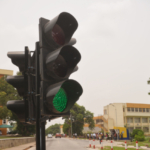
Every morning, long before the sun rises, children in Takoradi and other communities in Ghana lace up their shoes, sling schoolbags over their shoulders, and step into the darkness.
“We leave home around 4:30 because our house is far and there’s always traffic. If we delay, we’ll be marked late,” a pupil told JoyNews, capturing the daily struggle faced by hundreds of young learners.
Walking along dimly lit streets, some children move in small groups, chatting softly. Others tread alone, heads down, shivering in the cool, pre-dawn air. The laughter of a few cannot hide the exhaustion visible on many faces. For these children, the journey to school is a delicate balance between punctuality and well-being—one that no child should have to navigate alone.
Parents say they have little choice. Many start work before dawn, with wages and schedules that leave no room for transport options.
“I start work by 6 a.m.,” one mother explained. “If I don’t leave early, I’ll lose my job. So I wake the children up before 4:30 so they can walk together. It’s not safe, but there’s no other way.”
Rising transport costs and limited access to school buses force families to rely on older children to guide their younger siblings.
At Salient Junior College in Shema, Headmistress Portia Ebela Kuboi describes the situation as alarming. “Some of the children arrive as early as 5:00 a.m. and stay on campus until after 6:00 p.m.,” she told JoyNews.
“They are here before the teachers, waiting in the dark. It is unsafe and exhausting for them.”
She warns that as schools increasingly shoulder parental responsibilities, the health, safety, and emotional development of children are at stake.
Social welfare officials are also raising the alarm. Mr. Innocent Agbolosu of the Oti Regional Directorate of Social Welfare advised parents to seek help from trusted caregivers, stressing that children walking alone face unnecessary risks. He added that community-based childcare programs and social protection systems must be strengthened to support families juggling work and parenting.
This pre-dawn routine underscores deeper social and economic challenges. Many parents depend on early-shift jobs or daily wages, making early departures a necessity rather than a choice. Experts say the solution requires collective effort from parents, schools, communities, and government agencies.
Until such systems are in place, Ghana’s youngest learners will continue navigating streets in the darkness, carrying not only their books but the heavy burden of a system that asks too much of them too soon.



